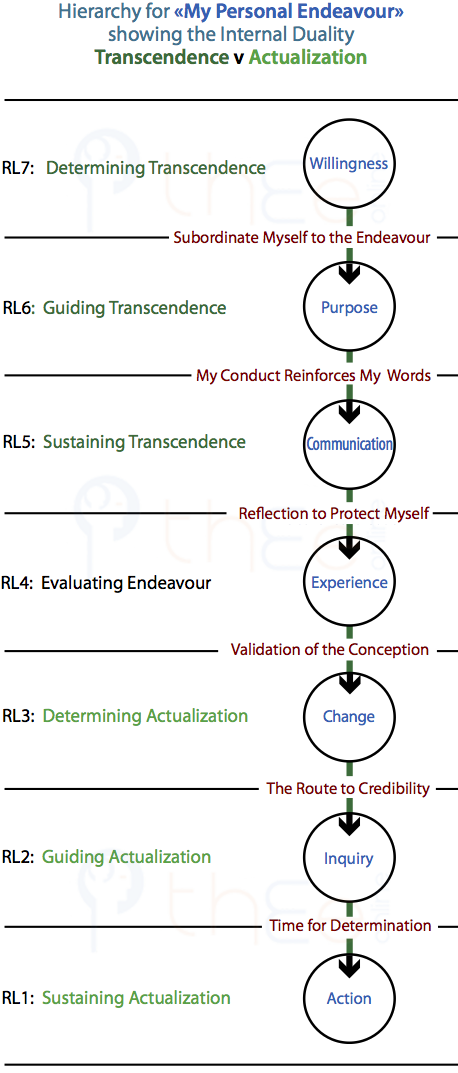From Willingness to Action
You have your endeavours, and I have mine. This framework seems to demand use of the first person singular, so I will think of . Remember:
Downward Transitions
The natural way for me to think of is to start from and move toward . It is easy to imagine to engage in some endeavour without being quite sure as to what and how. (It is harder for me to imagine acting without any mental superstructure: but see below.)
→
is vital or I will never start thinking or stir from my easy chair. But alone it does nothing without some rationale, ideal, direction or goal that really means something for me.![]() More:►
More:►
Note that if I create a purpose, it is a self-defining act because I have to subordinate myself to that intrinsically impersonal purpose (even if it is, say, for my self-development).

→
I know my , but the potential endeavour involves or affects others. I can only progress it if I articulate it well and then explain it and talk about it with others.![]() More:►
More:►
My communications are not simply what I say or write. My behaviour, demeanour and specific actions often speak louder than words. So I have to pay attention to my conduct in my relationships and possibly in public too.
→
Rushing to pursue an endeavour as described to others—even with their agreement, support and advice—is dangerous. It's my endeavour and there are risks for me: relational, reputational, financial, physical, psychological, career-based &c.![]() More:►
More:►
My inner sense of myself and my anticipation and mental preparation for situations generated by the endeavour is my only protection—from myself and from my goals.
→
The moment has come to plunge in—but into what? An ever-changing profusion of interpersonal and social processes, practical and physical obstacles, political and technological forces and hazards. I cannot proceed until I can envisage an achievable stable end-state.![]() More:►
More:►
Here is where it becomes evident whether my conceptions have any practical validity.
→
The multiplicity of issues surrounding the endeavour and the needed call out for clarification and resolution through .![]() More:►
More:►
As the process unfolds and is checked, conviction and credibility develop within you. If the endeavour is cooperative, others, who may wonder whether to participate, become more likely to join.
→
Testing and inquiring now reduce the risks and provide indications as to appropriate in relation to problems or opportunities. Without a flow of , no endeavour can be sustained.![]() More:►
More:►
The endeavour-conception is already , but the flow of that sustains the depends on my continuing personal determination to deal with the daily grind. This, in turn, is based on the value of the endeavour to me. When that value dissipates, the endeavour (or my part in it) ceases.
Having reached this point, is there any further requirement for endeavour? It seems not.
Upward Transitions
The upward transition does not seem so natural because without any psychosocial superstructure is so puzzling. But it is possible to create an explanation that makes some sense (perhaps).
→
It is easy to start at RL1, because endeavour evidently beds down in . Why would we want to move up a Level? Is there a pressing need?
Yes: we experience an immediate need for knowledge to inform and help us appreciate its consequences. Obtaining knowledge of any sort requires .
→
must be shaped and influenced by the need to ensure that an endeavour survives within a dynamic environment. Fitting and co-evolving is important, and so must be pursued and used to shape .
→
, i.e. postulated new states in which we and our endeavour stably fit the environment, must be calibrated against our experiences. We have to be mindful also of the of others through attuning. This awareness and our reaction to what we are aware of lets us govern and enable .
→
can be fallaciousArt is long--Life is short--Opportunity fleeting--Experience dangerous--and Judgement difficult. Hippocrates. The only way to check our is to reflect on them and discuss with others. is therefore required.
→
of any sort related to an endeavour, including about experiences, must be oriented by in the form of paradigms, beliefs, values and goals intrinsic to the endeavour. These also give shape and meaning.
→
, alone, achieves nothing. It needs the positive energy and inclination of to be used to produce effects.
Having reached this point, is there any higher that we can go? It seems not.
- Because this is the Root Hierarchy, it is a fundamental force for good. However, at the same time, it is necessarily also a force for destructiveness: should we so choose. Explore this perverse application of energies.
- The quality of the hierarchy and its Levels has now been sufficiently developed to provide a map to help handle my personal endeavours.
Originally posted: 06-Jul-2011. Last updated: 5-Jul-2012
All posted material is part of a scientific project and should be regarded as provisional. Visitors are encouraged to think through the topics and propositions for themselves. Copyright © Warren Kinston 2009-2016.
All Rights Reserved.